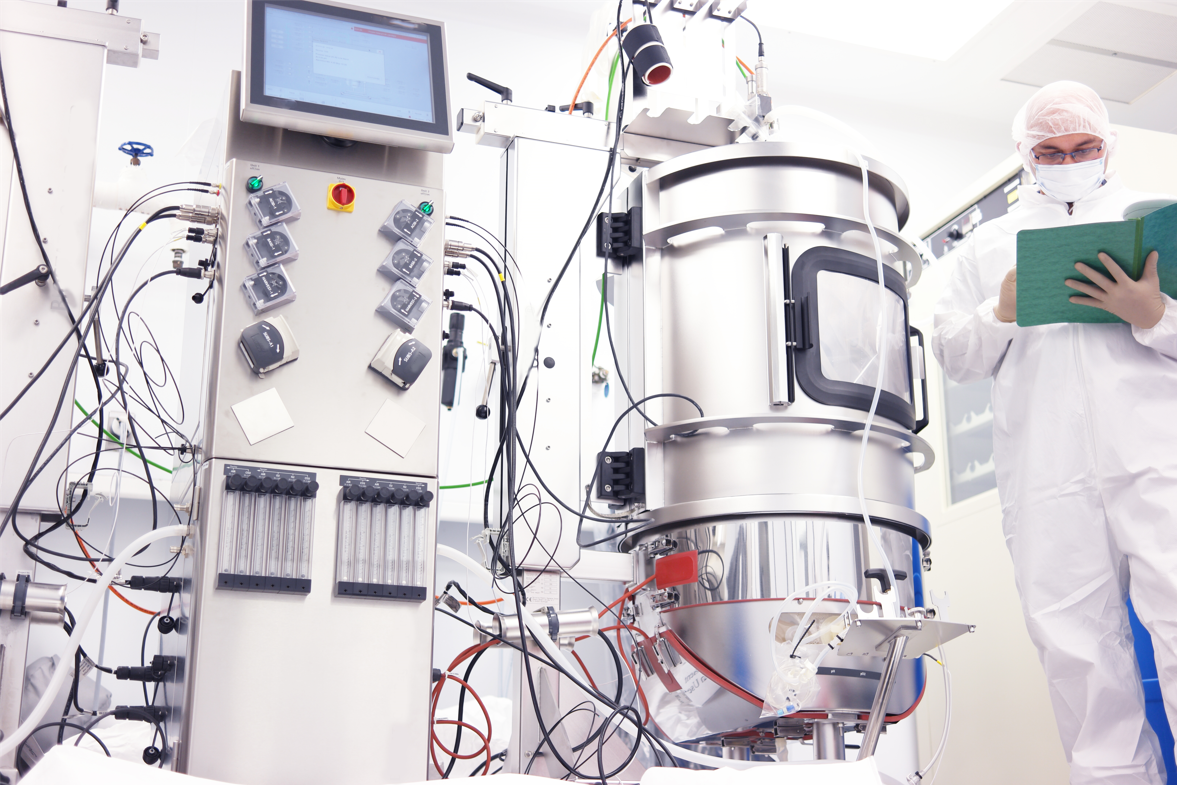Bioprocessing
What is Bioprocessing?
Bioprocessing is the process of increasing the number of living cells or  other biologic systems/components (such as bacteria, viruses, enzymes, proteins, or nucleic acids) in a commercial bioreactor for biopharmaceutical manufacturing. Products manufactured by the bioprocessing sector are typically high value therapeutics and vaccines, critical for the advancement of modern healthcare.
other biologic systems/components (such as bacteria, viruses, enzymes, proteins, or nucleic acids) in a commercial bioreactor for biopharmaceutical manufacturing. Products manufactured by the bioprocessing sector are typically high value therapeutics and vaccines, critical for the advancement of modern healthcare.
As bioprocessing relies on the growth and harvesting from precious biological cells/systems, it is imperative that the processing system is void of any contaminants, in particular microbiological contamination.
As a result of the bioprocessing process, manufacturers must use clean-in-place systems for equipment used in the process, and where possible, employ the use of single-use sterile consumables.
Bioprocessing Products:
The sterilization of these products can be a complex and delicate process that requires the highest quality standards. Respecting the expense and extensive R&D that our Customers have undertaken in developing these products, STERIS continues to place quality as its number one priority. Examples of bioprocessing products include:
- Therapeutic proteins
- Polysaccharides
- Vaccines
- Diagnostics
- Antibiotics
Sterile Consumables Supporting Bioprocessing
As part of the bioprocessing manufacturing process and eliminating sources of contamination, sterile components are used to help maintain sterile/aseptic conditions, necessary for the safe propagation of the biological system. Examples of such sterile components include single-use systems (SUS) and disposables, serum and serum-derived proteins.
Single-Use Systems (SUS) and Disposables
Single-use sterile systems and disposables (such as bioprocess bags) are typically used in manufacturing to complement the use of good manufacturing practices and minimize the reliance on disinfection of equipment. Single-use systems are also used to transport pharmaceuticals during the distribution and manufacturing process and can range from 1 liter to 3,000 liters or greater.
At STERIS, we can assist bioprocessing manufacturing Customers with the sterilization of single-use systems and disposables. Through our global network of locations, STERIS offers a comprehensive array of contract sterilization options using electron beam irradiation, gamma irradiation, and X-ray irradiation.
Serum and Serum-Derived Proteins
Serum, such as fetal bovine serum (FBS), is used in bioprocessing for diagnostic applications, preparation of vaccines, and in-vitro diagnostics. Serum and serum-derived proteins are a critical component of drug development and biopharmaceutical production, and must be sterile prior to production.
At STERIS, we can assist bioprocessing manufacturing Customers with the contract sterilization of these serums using radiation sterilization technologies, such as electron beam irradiation, gamma irradiation, and X-ray irradiation.
At STERIS, we understand the very specific requirements of this product line and provide Customers with the following services to accommodate these highly valued products:
- Critical temperature control prior to and after processing
- The ability to deliver extremely tight dose ranges
- Rapid turnaround time
- Technical consulting and product validation services
- Highest quality documentation and product processing
Contract Sterilization
STERIS provides radiation technologies for the treatment of sterile supplies to the bioprocessing sector. Technologies such as electron beam, gamma and X-ray may be employed.
- Electron beam uses high-energy electrons for a variety of applications. E-beam irradiation can penetrate a wide range of materials and deliver the required irradiating dose in just a few seconds, meaning the entire process can take place in minutes.
- The gamma irradiation process uses Cobalt 60 to emit photon radiation and offers good penetration of dense products and is ideal for many types of materials and their packaging.
- The X-ray irradiation process utilizes photon radiation and can effectively treat a wide variety of materials with varying densities, configurations, and orientations. The combination of shorter exposure time and improved Dose Uniformity Ratio (DUR) make X-ray irradiation a viable processing option for a variety of products.
To learn more about qualification of a radiation process, please click here.
Support Services
In addition to irradiation sterilization, STERIS provides our Customers with testing services and technical support solutions at every stage of the sterilization design process, from product development through routine processing.
Our Radiation TechTeam® guides Customers through the irradiation validation process, provides solutions for unique project needs, and supports routine processing through quarterly dose audits.
Our testing services provide Customers with validation support and microbial testing of their products processed with irradiation, as part of our complete radiation validation program.
Equipment and Consumables
STERIS Life Sciences supports the development of drugs, vaccines, and therapeutics through its equipment and formulated chemistries. Go here to learn more.



